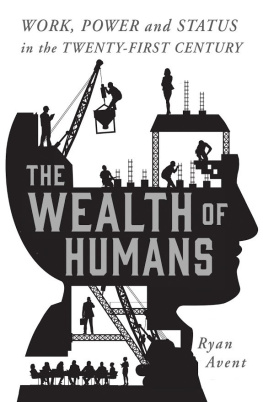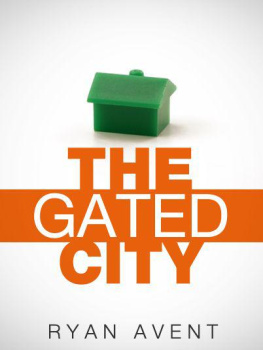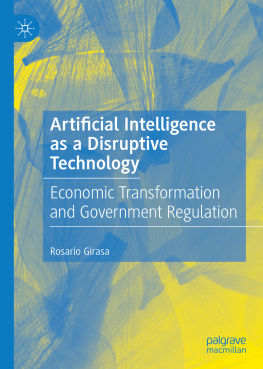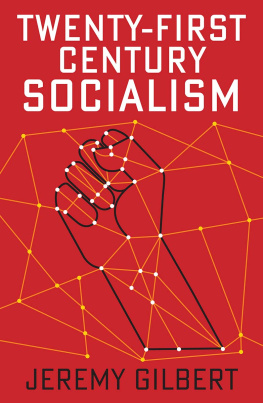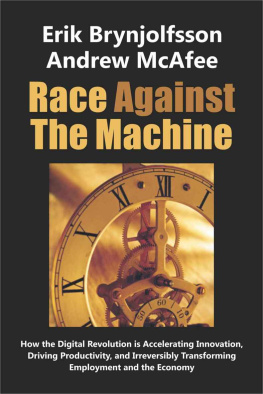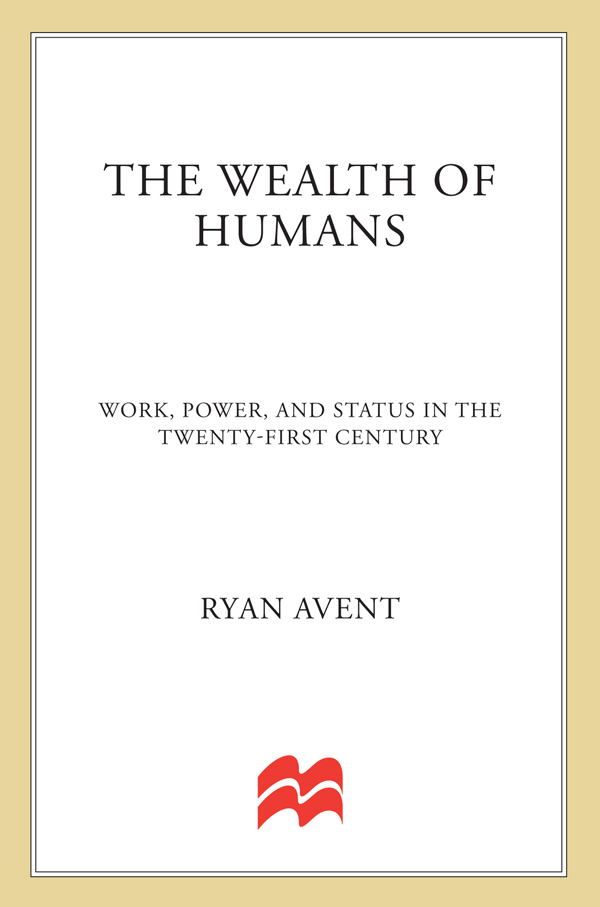Contents
Guide

The author and publisher have provided this e-book to you for your personal use only. You may not make this e-book publicly available in any way. Copyright infringement is against the law. If you believe the copy of this e-book you are reading infringes on the authors copyright, please notify the publisher at: us.macmillanusa.com/piracy.
A man must always live by his work, and his wages
must at least be sufficient to maintain him.
Adam Smith, The Wealth of Nations
Dont mourn for me, friends, dont weep for me never,
For Im going to do nothing for ever and ever.
Epitaph for a charwoman, traditional,
quoted in Economic Possibilities for our
Grandchildren, John Maynard Keynes, 1930
In January of 2014, The Economist, my employer, published a piece I had written on the future of work in an age of rapid automation. A sample:
Ten years ago technologically minded economists pointed to driving cars in traffic as the sort of human accomplishment that computers were highly unlikely to master. Now Google cars are rolling round California driver-free no one doubts such mastery is possible A taxi driver will be a rarity in many places by the 2030s or 2040s bad news for journalists who rely on that most reliable source of local knowledge and prejudice.
Not long after, a minor earthquake rattled the city of Los Angeles early in the morning. Within minutes, the first news report on the quake hit the wires:
A shallow magnitude 4.7 earthquake was reported Monday morning five miles from Westwood, California, according to the US Geological Survey. The temblor occurred at 6:25 a.m. Pacific time at a depth of 5.0 miles.
Whats notable about this second piece is not its content but its author, a piece of software (Quakebot) developed by a programmer at the Los Angeles Times.
The two pieces, mine and the robots, were not especially alike. Quakebot is less given to chin stroking, for a start. My story was the product of months of research, reporting and writing: time spent building a view of the world and crafting an argument to support that view. It contained telltale signs of the authors attempts to make it interesting to readers. But they were both recognizably journalism: intelligible, grammatical, informative. Journalism might outlast driving as a profession, but not, perhaps, by as many decades as we ink-stained scribblers would prefer.
Neither is automation the only threat to our livelihood presented by the digital revolution. At the time of writing, the inflation-adjusted value of advertising in American print newspapers has fallen back to a level last seen in 1950. It may soon touch an all-time low. Lets be honest: it may soon touch zero.
The digital revolution is now teaching journalists and other workers of the rich world what a tectonic economic transformation feels like. It is putting us in the shoes of our great-great-grandparents: those who first experienced the transmission of a human voice across an electrical wire, who watched as the time to travel from one city to a distant other shrank from weeks to hours, and who found themselves displaced from jobs as smiths or farmhands by fantastic new technologies.
We have all found our working lives altered by it. Older workers might recall a time when factory work was still good work, easy to find, even for those without much education. Or they might remember a time when offices were jammed with clerical staff hammering at their typewriters and shuffling piles of paper around. But the pace of change is such that even the youngest members of the labour force can remember a different world. Services such as Uber and Airbnb, virtually unknown at the beginning of this decade, are fundamentally transforming industries that employ millions of people. Products such as Slack, a chat service designed to make it easier for colleagues to collaborate, are altering communication within workplaces, and clever bots that can email your contacts or order you lunch participate in the conversation just like human colleagues.
The pace of change particularly disorients workers in their forties or fifties, those whose decades of experience as a taxi driver or an administrative assistant might suddenly become less remunerative, or even worthless, in the years of work left to them before their planned retirements. And those now entering the labour force for the first time can have little confidence that their training will be of any use across the whole of their career assuming that a career is a meaningful concept a half-century from now.
My own field has faced near constant disruption over the past couple of decades. Digital technology cost many printers their jobs long ago. Then came the internet, which allowed readers all over the world free access to a torrent of news and analysis, undermining subscription-based forms of journalism, while services such as Craigslist gutted newspapers advertising revenue. Now firms such as Facebook and Apple are rolling out curated news feeds which promise to serve readers with the best stories from publications around the world undercutting another of the valuable roles played by skilled editors. As a news consumer, this world thrills me; it is easier than ever to read brilliant journalism about all sorts of things, on subjects and from perspectives that might never before have got much of a platform. As someone who earns a living by the pen, however, I am nervous.
Our concerns are not simply about the uncertainty of employment in the years to come. Those of us who currently appear to have job security can more than likely look forward to making less in the future than we had once hoped we might. Over the last couple of decades, wages, adjusted for inflation, have scarcely grown throughout a broad range of rich countries longer in some cases.
Wages have been rising in the fast-growing emerging economies, by contrast. But even there these other two trends concentration of income in the hands of capital owners, and in the paycheques of the richest workers are a growing source of concern.
Then there is the sobering data on employment. In America, the share of adult men of prime working age who are working or actively looking for work has fallen steadily, and in some cases dramatically, over the last generation. Among all men, the rate of participation in the workforce dropped from about 76 per cent in 1990 to 69 per cent in 2015.
This trend is not limited to America, and neither can it be explained away as the product of ageing and retirement. In Europe, one in five adults under the age of twenty-five is unemployed. Across the Organization for Economic Co-operation and Development (OECD), 12 per cent of people aged between fifteen and twenty-nine are neither in school nor work. Some are engaged in illicit activity or are in jail; others are in their parents basements playing video games. Much the same is true of the long-term unemployed, many of them older men without much education, who drift around, often drinking to pass the day, lacking much, if any, connection to society at large.
For an awful lot of people, work has become a less certain and often less remunerative contributor to material security. It is a development that makes political forces of populist outsiders, such as Donald Trump and Marine Le Pen, and bestsellers of wonky economics books, such as Thomas Pikettys Capital in the Twenty-First Century, an analysis of global inequality published in 2014 that flew off the shelves. Work is not just the means by which we obtain the resources needed to put food on the table. It is also a source of personal identity. It helps give structure to our days and our lives. It offers the possibility of personal fulfilment that comes from being of use to others, and it is a critical part of the glue that holds society together and smoothes its operation. Over the last generation, work has become ever less effective at performing these roles. That, in turn, has placed pressure on government services and budgets, contributing to a more poisonous and less generous politics. Meanwhile, the march of technological progress continues, adding to the strain.


